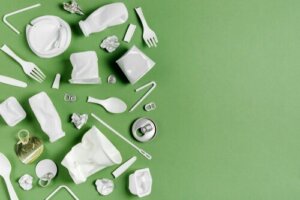Are Obesogens Your Diet's Biggest Enemy?


Written and verified by the nutritionist Saúl Sánchez Arias
These types of substances increase the risk of weight gain. What’s more, their effects are even more harmful when they take place during the early stages of life and continuously. In addition, they may have to do with the increased risk of developing other types of diseases.
Phthalates as obesogens
Phthalates are a series of compounds that are added to certain products that we use on a regular basis. In and of themselves, they’re not toxic and the liver is able to break them down. Just the same, they can produce certain negative effects on our health. And this is especially true when it comes to weight gain.
A study published in the journal Chemosphere found that exposure to these types of compounds in pregnant women caused low birth weight in babies. However, it’s associated with a greater risk of weight gain in later stages, including adulthood.
We can find these substances mainly in cosmetic products, plastic items, and cleaning products. They can act on the endocrine system, hindering its function.

Find out more: Seven Toxic Ingredients to Avoid in Cosmetics
Bisphenol A
This chemical compound is often present in plastics, as well as soft drink cans. Their risk lies in that, on occasion, it can spread from packaging into the foods or drinks they contain. And, as a result, they can make their way into the human body when we eat or drink.
Articles like the one published in the journal Environmental Health associate exposure to these types of compounds with the metabolic pathologies. In fact, these substances are capable of contributing to the appearance of diabetes and hypertension, with all of the negative effects that these diseases have on our health.

You may also want to read: 8 Positive Health Changes When You Give up Soft Drinks
Other obesogens: Tobacco smoke
Tobacco smoke also falls into the category of obesogens. In this case, the compound can contribute to the increase of developing cancer, according to a study published in Cancer Prevention Research. In fact, both smokers and passive smokers can experience hormonal disruptions that negatively affect their health.
How to avoid these kinds of substances?
When it comes to looking out for your health, there’s a lot more to it than just paying attention to what you eat. You also need to be aware of the fact that the packaging can also contain a series of harmful substances.
Therefore, whenever possible, you should opt for foods that are ecologically produced and that don’t use excessive amounts of plastic in their packaging. Another useful strategy is to avoid refilling plastic water bottles and replace them with glass or stainless steel containers.
Just the same, there are certain factors that are difficult to control. For example, environmental pollution or exposure to second-hand smoke isn’t always something you can avoid.
Therefore, it’s essential that you increase your intake of foods that possess antioxidant properties. Substances of this nature are capable of combating against damage to cellular DNA. What’s more, they also improve hormonal function.
Obesogens are your diet’s biggest enemy
The relationships between obesogenic goods and health are not completely clear. However, experts believe these products have negative implications for our bodies. Weight gain and obesity aren’t the only reasons obesogens are your diet’s biggest enemy. Rather, they can lead to a number of different serious illnesses.
Therefore, it’s best to avoid them as much as possible. To do so, you should consume foods that come from ecological sources and never reuse plastic food and beverage packaging. What’s more, when it comes to choosing cosmetics, you should carefully read the labels to make sure they don’t contain any of the above substances.
Just the same, keep in mind that completely eliminating your exposure to these kinds of products is difficult. In fact, it’s nearly impossible. Therefore, it’s crucial that you adjust your diet in order to give your body the nutrients it needs to prevent oxidation.
What’s more, a good diet will help contribute to the correct functioning of the hormonal system. And, at the same time, it will reduce the markers associated with poor metabolic health.
At the same time, exercising on a regular basis also plays a key role in this process. Combining physical activity with proper nutrition is an excellent way to promote good health.
All cited sources were thoroughly reviewed by our team to ensure their quality, reliability, currency, and validity. The bibliography of this article was considered reliable and of academic or scientific accuracy.
- Jin F., Thaiparambil J., Ramya Donepudi S., Vantaku V., et al., Tobacco specific carcinogens induce hypermethylation, DNA adducts, and DNA damage in bladder cancer. Cancer Prev Res, 2017. 10 (10): 588-597.
- Song Q., Li R., Zhao Y., Zhu Q., et al., Evaluating effects of prenatal exposure to phthalates on neonatal birth weight: structural equation model approaches. Chemosphere, 2018. 205: 674-681.
- Ranciere F., Lyons JG., Loh VHY., Botton J., et al., Bisphenol A and the risk o cardiometaboli disorders: a systematic review with meta analysis of the epidemiological evidence. Environ Health, 2015.
This text is provided for informational purposes only and does not replace consultation with a professional. If in doubt, consult your specialist.








